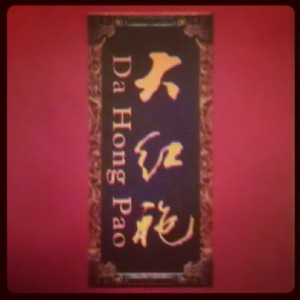Dialog: Authentic Da Hong Pao, or Big Red Robe
By Tea Lover
Appellation. For wine and other products, appellation offers legal protection. It prevents a tea labeled “Darjeeling” from being produced outside of the designated geographical region of Darjeeling. Even though it has been produced for generations, da hong pao tea does not yet have such a recognized (and enforced) appellation. So I asked 2 colleagues to help clarify what it means to have an authentic “da hong pao.”
Peter Luong is a second-generation owner of Red Blossom Tea in San Francisco. He and his sister Alice took over the family business from their father. They specialize in Taiwanese and Chinese teas.
Timothy Hsu created The Mandarin’s Tea Room (link dead) to offer select, (even custom crafted) teas and a tea tasting atmosphere in New York City.
Both Peter and Timothy travel to origin, and are fluent Chinese speakers. Given the thorough visits and the relationships they have cultivated, they offer real, deep insight from farmers and industry experts on understanding Da Hong Pao (大红袍), or Big Red Robe wulong tea.
JW: Talking about the plants themselves, what makes da hong pao authentic?

PL We (Red Blossom) define Da Hong Pao as a cultivar, and we feel that that cultivar is best when grown within the actual Wuyi range. A truly authentic da hong pao is one that is a direct descendant of the original da hong pao. The general agreement amongst tea producers in Wuyishan that I have spoken with is that the one closest in genetic make-up to da hong pao is a cultivar called “beidou” (北斗).
TH
Da Hong Pao is a sub-varietal of ShuiXian. Like Golden Key or Tie Luo Han, each has their own special character profile besides the terroir. It should also grow around the original mother trees or at least inside the Wuyi Nature Reserve to be considered authentic.
JW: I noticed you both noted authenticity applies when the right plant grows in the right location.
TH
It is very much all about location if you are a tea connoisseur, in my opinion. Just like drinking Lion Peak Longjing, or a champagne, for example. It’s not legally a champagne if the production is not from the Champagne region of France.
PL
Yes, it needs to come from the Wuyi mountains. It needs to be a zheng yan (正岩). (Editor’s note: See this post on the differences between zheng yan and other classifications.) This is an issue in China, as a lot of wuyis do not come from the actual wuyi mountains but from surrounding tea gardens. It’s a huge issue in the US because I think most of the wuyis being sold here are not “zheng yan”. They are teas grown outside the wuyi mountains (the best tell is price for some of these teas). For example, it’s impossible to have a zheng yan at a price point that some of these teas are being sold for.
JW: But some Wuyi teas just get piled together and sold under the name “da hong pao.” Are there any tells that can help a discerning tea drinker distinguish the more authentic from the less?
PL
Today, the term da hong pao has become an almost generic marketing term, used as a label for “high grade” “wuyi” oolongs. I have quotes around both high grade and wuyi because sometimes, what is being sold is neither high grade nor from the wuyi mountains.
More often than not, what is being sold as da hong pao are blends that consists mostly of Huang guan yin, an incredibly floral cultivar. The use of Huang Guan Yin as a stand-in for da hong pao is based on the incorrect assumption that anything high grade needs to be incredibly floral. What’s amiss is that true beidou /da hong pao is not floral. It has a slightly medicinal character, but is prized for its balance. I like to think of it as a carrier of all the traits for which the individual Wuyi cultivars are known, but in a way that balances their various distinct notes (minerally, floral, rich, etc.).
JW: This conversation could go on, and I hope it does. We haven’t touched upon other potential points, like harvest time and processing factors contribute to authentic da hong pao character. My thanks to Peter and Timothy for contributing.
Compare teas with others on the Scoresheet.
Walker Tea Review- a tea blog with tea reviews and tea tastings.
Want to see a tea reviewed? Contact me: jason@walkerteareview.com